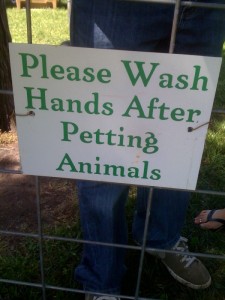The UK Public Health Agency (PHA) is reminding families about the importance of washing hands after visiting the farm.
 All animals naturally carry a range of organisms, some of which can be transmitted to people. Some organisms which may be contracted on farms present a serious hazard and can potentially cause severe infection, particularly in young children.
All animals naturally carry a range of organisms, some of which can be transmitted to people. Some organisms which may be contracted on farms present a serious hazard and can potentially cause severe infection, particularly in young children.
To reduce the risk of illness, both adults and children should wash their hands thoroughly using soap and water after they have handled animals or touched surfaces at the farm and always before eating or drinking.
Antibacterial hand gels and wipes are not a substitute for washing hands with soap and water, as gels and wipes may be unable to remove contamination in the way that running water can. However, using such gels after hand washing with soap and water may reduce further the risk of picking up these infections.
Dr Philip Veal, Consultant in Health Protection at the PHA, said: “Farm animals often carry a range of organisms which can be passed to children and adults. These organisms can include serious infections such as E. coli O157 which is extremely contagious and easily passed from animals to children and then within the household.
“Hand washing with soap and water will reduce the risk of picking up these infections, which can be particularly harmful to young children. By being aware and by doing these simple things we can help to avoid illness and enjoy a fun day out.”
Best practices for planning events encouraging human-animal interactions
03.Apr.14
Zoonoses and Public Health
G. Erdozain , K. KuKanich , B. Chapman and D. Powell
http://onlinelibrary.wiley.com/doi/10.1111/zph.12117/abstract?deniedAccess
Educational events encouraging human–animal interaction include the risk of
zoonotic disease transmission. It is estimated that 14% of all disease in the US caused by Campylobacter spp., Cryptosporidium spp., Shiga toxin-producing Escherichia coli (STEC) O157, non-O157 STECs, Listeria monocytogenes, nontyphoidal Salmonella enterica and Yersinia enterocolitica were attributable to animal contact. This article reviews best practices for organizing events where human–animal interactions are encouraged, with the objective of lowering the risk of zoonotic disease transmission.
